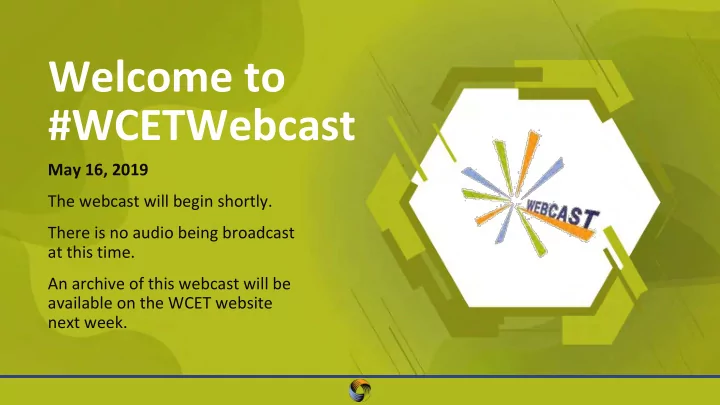

Welcome to #WCETWebcast May 16, 2019 The webcast will begin shortly. There is no audio being broadcast at this time. An archive of this webcast will be available on the WCET website next week.
Student Ready INCREASING RETENTION FOR UNIVERSITIES AND CAREER OUTCOMES FOR STUDENTS MAY 16
Welcome! Use the question box for questions and information exchange. Archive, PowerPoint, and Resources available will be next week. PowerPoint can be downloaded via the link in chat. MEGAN RAYMOND Director, Programs Follow the Twitter feed: & Sponsorship #WCETWebcast. WCET mraymond@wiche.edu @meraymond
Questions from the Audience If you have a question during the presentation, please add your questions to the question box. We will monitor the question box and have time for Q&A at the end of the presentation.
Moderator MEGAN RAYMOND Director, Programs & Sponsorship WCET mraymond@wiche.edu @meraymond
Presenters DREW GEANT MICHAEL HORN CEO and Co-Founder Co-Founder Wyzant Clayton Christensen Institute for Disruptive Innovation
Overview What exactly is a “post- 1 traditional” student? Why is it important to focus 2 on them? Why are post-traditional 3 students struggling to finish college? What solutions can institutions 4 offer to increase post- traditional degree completion?
Defining “Post-Traditional” “Post-traditional” as a term was coined by Excelsior College president Jon Ebersole in a 2013 American Council on Education manifesto to refer to the millions of adults already in the workforce who lack a credential but pursue post- secondary education alongside other responsibilities.
Today’s College Students Infographic
The Degree Completion Problem This number drops to 60% 30-35% of students who enroll in college for students with full-time complete post-traditional their degree characteristics. within 6 years. Source: Lumina Foundation
Degree Non-Completion Widens Economic Gaps Median annual earnings among full-time workers ages 25 to 32, in 2012, in dollars Source: Pew Research Center
Degree Non-Completion Widens Economic Gaps Lifetime earnings trajectories Source: Georgetown University, Center on Education and the Workforce
Degree Non-Completion Widens Economic Gaps Median lifetime earnings by highest education attainment Source: Georgetown University, Center on Education and the Workforce
Why Aren’t Post-Traditional Students Graduating?
“Readiness” Gaps Post-traditional students are often underprepared in two areas: Academic Non-cognitive
Academic Gaps Academic knowledge gaps: Students being unprepared academically for the rigor of university work Often the result of One-third of post-traditional overlooked foundational students are unsure of their skills (writing, algebra) academic abilities Source: Education Dynamics
Academic Readiness Gaps Disproportionately Affect Post-Traditional Students Source: National Center for Public Policy and Higher Education
Non-Cognitive Gaps Non-cognitive knowledge gaps: Students are unprepared in their development of Non-traditional students social and emotional skills. are much less likely to feel Non-cognitive skills cut they are socially connected, across subjects and supported by their peers, or disciplines. have friends at school. Source: Barnes & Noble College: College Insights
Non-Cognitive Gaps Disproportionately Affect Post-Traditional Students
Academic & Non-Cognitive Skills are Intertwined
Becoming Student Ready: Solutions
What Does it Mean to Become Student-Ready? Shifting mindsets from expecting students to “fill their own gaps” or “come prepared” when seeking post-secondary education to universities need to considering the entirety of student needs and implementing solutions to help them succeed.
SOLUTION 1 Corequisite Courses As opposed to having students enroll Corequisite courses can easily be remedial courses, corequisite courses paired with additional reinforcement - are more rigorous and credit-bearing such as small-group seminars or one- on-one tutoring - to fill academic gaps and simultaneously develop non- cognitive learning strategies
SOLUTION 2 Competency-Based Education Models CBE awards credit for skill, Professors and tutors in CBE models competency, and knowledge mastery. often possess industry expertise and provide proactive support designed to address the unique needs of self-paced Competencies are often tied to learners. demands of the workforce, making this model more suitable for the working student. Greater flexibility for including credits from other institutions. Greater flexibility for self-paced learning.
SOLUTION 3 Proactive, Tech-Enabled Advising Systems Technology enables Smart platforms can Advisors freed from advisory services to be nudge students who manual enrollment available to students need help, rather than tasks can focus more outside the hours of waiting for them to closely on providing 9am - 5pm, which is reach out. personalized advice. much more suitable for working students.
SOLUTION 4 Flexible, Deep and Ongoing Expert Resources External expert Bloom’s Two Sigma: Ongoing one-on-one resources can address there is no form of tutoring relationships needs surfaced in early teaching more effective provide students with a warning systems with than one-on-one continuous support precision and depth. tutoring, particularly system, accelerating from well-trained tutors progress and boosting who understand their confidence. subject well.
Questions from the Audience 27
Learn More and Stay Connected Visit WCET’s website to learn about our Join WCET: learn more about the benefits Focus Areas, Initiatives, Events, Membership of joining our national community and Sponsorship http://wcet.wiche.edu/join-wcet http://wcet.wiche.edu/ Focus Areas Initiatives Events Get Involved
Contact Information We’d love to hear from you! Email the Wyzant team at: highered@wyzant.com
Join us for the #WCETSummit https://wcet.wiche.edu/events/summits/workforce-partnerships-that-work-2019
Join us for the #WCET19 Registration opens in June! https://wcet.wiche.edu/ events/annual-meeting
Additional Information and Resources Access to the resources discussed during this webcast, including the archive, will be available next week. http://wcet.wiche.edu/connect/webcasts 32
Thank you Supporting Members for your commitment to WCET and eLearning Colorado State Michigan State University of Missouri - University University Columbia/Mizzou Online 33
Thank you WCET Annual Sponsors Learn more https://wcet.wiche.edu/get- involved/sponsorship/sponsors
Recommend
More recommend